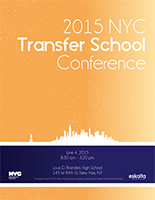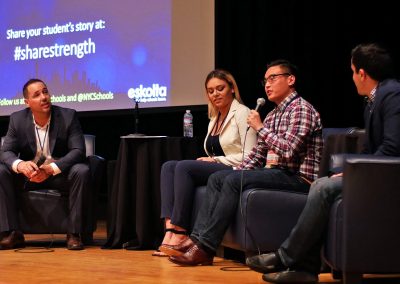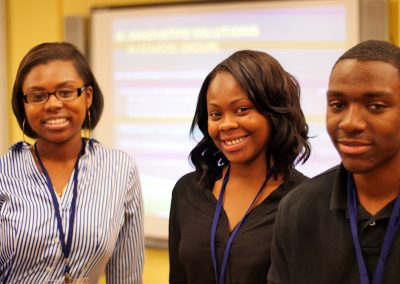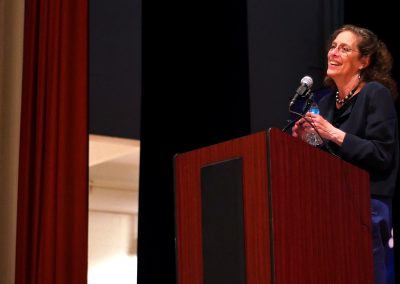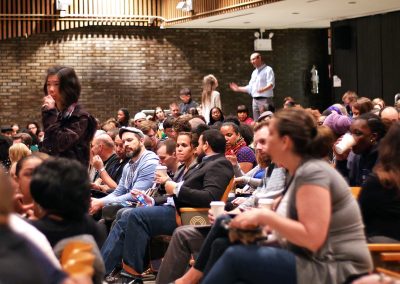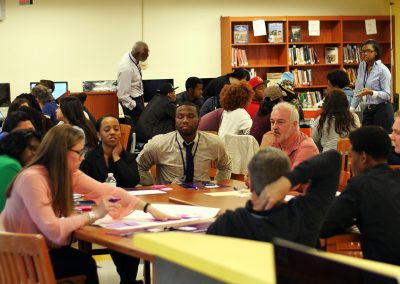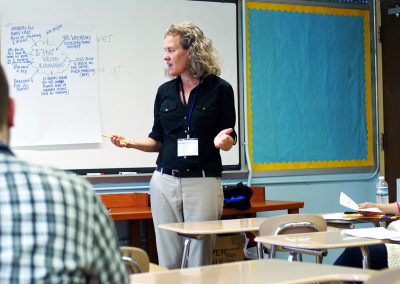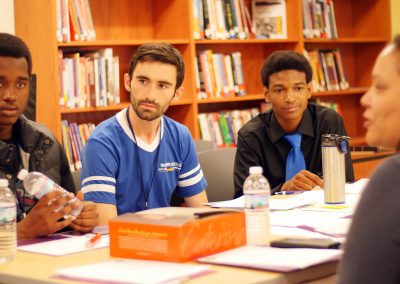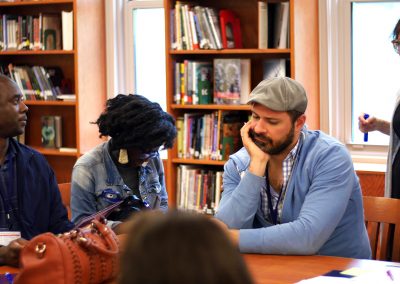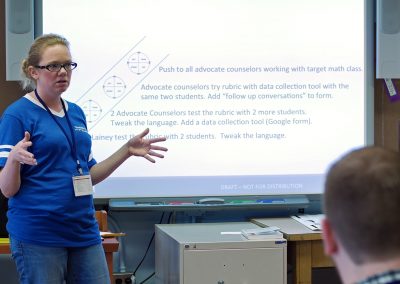2015 Transfer School Conference
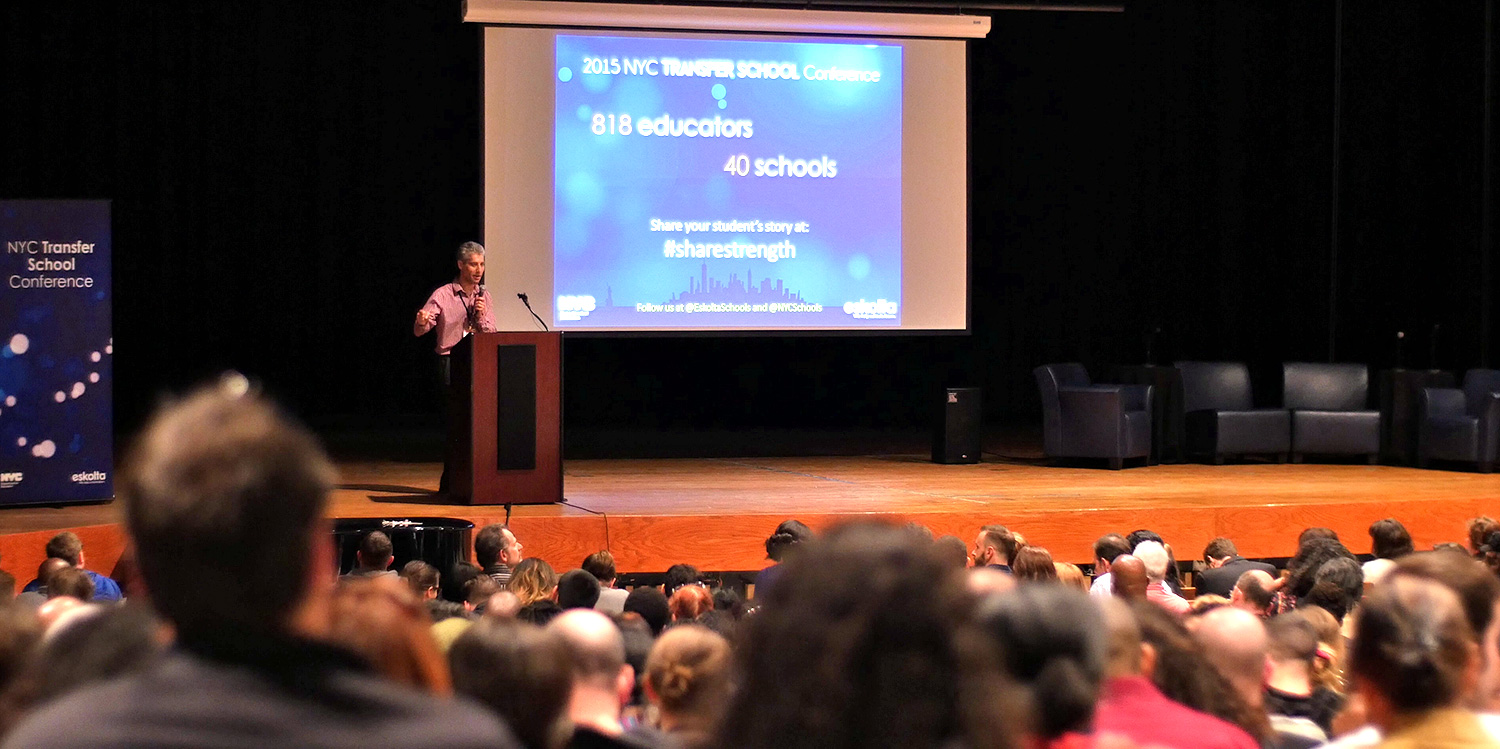
The 2015 Transfer School Conference was Eskolta’s biggest event to date, with more than 800 participants from 40 schools in attendance. The opening convocation featured Phil Weinberg, Deputy Chancellor for Teaching and Learning at the New York City Department of Education, who addressed the group with a reminder of the scope of the transfer school population: NYC transfer schools serve 12,782 young people in 51 schools. Weinberg went on to add that everyone “shares the responsibility to create the conditions to re-engage students and to tap into their resilience, to tap into their persistence, to empower them to graduate with real options for their future.” Rounding out the opening convocation, Lynette Lauretig, Senior Director of Multiple Pathways in the New York City Department of Education’s Office of Postsecondary Readiness, and Eskolta Executive Director Michael Rothman, highlighted the value of every attendee’s experience and commitment to the students failed by the traditional school system. They both noted the importance of having a space exclusively for transfer school staff and partners to share ideas and collaborate.
The conference included nearly 70 workshops spanning a broad range of topics. Attendees learned from fellow transfer school educators about strategies being used “on the ground” in sessions such as Transition Planning for the IEP Student and College-Ready Academic Habits.Many workshops were presented by organizations that work closely with the transfer school population. Some highlights included the Dance Theatre Etcetera session Spoken Word Poetry and Rap as Pedagogy, StoryCorpsU’s Building Community in the Classroom: Why Do Stories Matter?, and Real Stories, Real Teens: The Power of Narrative from Development Without Limits.
Building on the panels from last year’s conference, this year’s panels focused on youth development and research on the brain. In a panel moderated by JoEllen Lynch of Springpoint, speakers Lili Allen of Jobs for the Future, Sabrina Evans Ellis of the Youth Development Institute, and Paul Forbes of the Expanded Success Initiative at the DOE discussed the central role of youth development in college and career readiness. Another special guest, Vanessa Rodriguez, a doctoral candidate at the Harvard Graduate School of Education and author of The Teaching Brain, engaged participants in a presentation about the importance of understanding the difference between teaching and learning.
An intensified focus on student involvement this year gave both current and former scholars the chance to contribute to discussions about issues central to the transfer school system. A popular event was a panel headed by alumni Samantha Fernandez, John Melo, and Abraham Im, who shared their experiences and successes as former students who have gone on to college. Student facilitators from Student Voice Collaborative led a new workshop this year, Tackling Engagement Together: A Student-Staff Think Tank, during which adult participants were joined by student representatives from their schools to exchange ideas on how to keep students involved and invested in their education. Student Voice Collaborative members also attended Student-Led School Improvement, a workshop aimed at expanding a model of addressing specific student-identified challenges in schools across the city with targeted, student-led campaigns.
Michelle Fine, Distinguished Professor of Social Psychology, Women’s Studies, American Studies and Urban Education at the Graduate Center, CUNY, closed out the day with an engaging and pragmatic talk tying larger city- and society-wide systemic issues of educational equity to transfer schools and educators specifically. Michelle encouraged the attendees to recognize and understand the causes of educational inequality and how it affects the students they serve, but also to bear in mind the crucial role they play in helping students navigate the challenges they face. As she told the attendees, the overall system and context provides a large amount of “acid rain” for students to overcome, and “what you are doing is holding an umbrella. You’re not stopping the acid rain, [but] you’re holding an umbrella over most young people’s lives and giving them an opportunity to revise. And for that … all the people of New York should thank you.”

